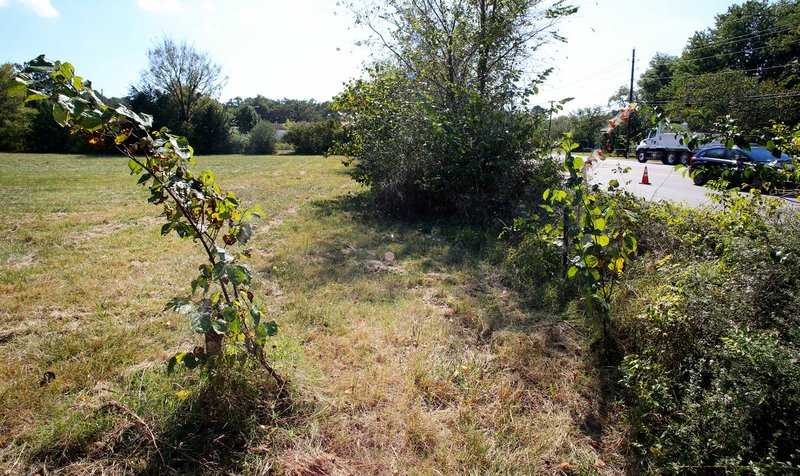FAYETTEVILLE -- Planning commissioners on Monday signed off on an idea to bring an encampment of small shelters for homeless residents to the southeast end of town and will later address the plan's specific details.
The New Beginnings Community would put 20 A-frame microshelters, along with a 2,900-square-foot central service building, on about 5 acres just south of 19th Street at South School Avenue. The property sits next door to 7 Hills Homeless Center.
The University of Arkansas, Fayetteville owns the land, as well as about 30 more wooded acres to the east and just more than 20 acres north of that. Representatives with ServeNWA, the nonprofit organization behind the community, have said the campus will serve as the base for a transitional housing program. The nonprofit organization intends to buy the 5 acres from the university.
Kevin Fitzpatrick, director of the university's Community and Family Institute and ServeNWA board member, said the latest version of the proposal includes characteristics of similar camps nationwide. The central building would feature showers, toilets and washing areas. The shelters would have some sort of heating and air conditioning system. Clusters of three to four shelters at a time would share a fire pit.
Commissioners looked at the plan about a month ago and asked for some design changes. A fence along the east side of the property now will separate the campus from the additional acreage. The camp itself also has a fence surrounding it.
The Planning Commission on Monday approved a permit to let ServeNWA put the microshelter camp on the property. The commission will have to renew the permit after five years as a condition of its approval.
Neighbors who live on or near 19th Street spoke against the project and more specifically about the current problems associated with the homeless population in the area. The university does little to curtail littering and waste, and homeless residents living in camps there frequently disrespect property boundaries, they said.
Having space for 30 or so people to live at the camp won't be enough to fix the problem, Robert Stockalper said.
"If I owned that piece of property, I'd be getting a letter from the city attorney telling me to clean it up or I'll start getting fined," he said.
National experts say the concept, while relatively new, can work if done correctly.
Megan Hustings, director of the Washington-based National Coalition for the Homeless, said more microshelter camps have popped up as cities try to come up with ways to tackle affordable housing. Community-driven camps in which tenants have a say in planning and rules usually have fewest instances of violence or conflict, she said.
However, the idea serves as a Band-Aid to a much larger wound, Hustings said.
"It's not the permanent solution. It's not an ace in the hole. If you really want to truly end things and make a change, you have to make considerable investments," she said. "And that's just hard for communities to do."
Fitzpatrick said he wants New Beginnings to serve as part of a coalition to tackle homelessness, not just in that area but in the region generally. The camp also would be a self-governed community with full security monitoring, he said.
"There are already 100 people that are living in or around that area, and they are not being controlled," Fitzpatrick said. "They are not being managed. What we want to start to do is whittle away at that."
Planning commissioners a̶d̶d̶e̶d̶ ̶t̶o̶ ̶t̶h̶e̶i̶r̶ ̶c̶o̶n̶d̶i̶t̶i̶o̶n̶s̶ encouraged* that ServeNWA work with the regional Continuum of Care throughout development of the project.
Metro on 11/14/2017
*CORRECTION: Fayetteville planning commissioners encouraged ServeNWA to work with the regional Continuum of Care to end homelessness in Northwest Arkansas. A previous version of this story in mischaracterized their request.
